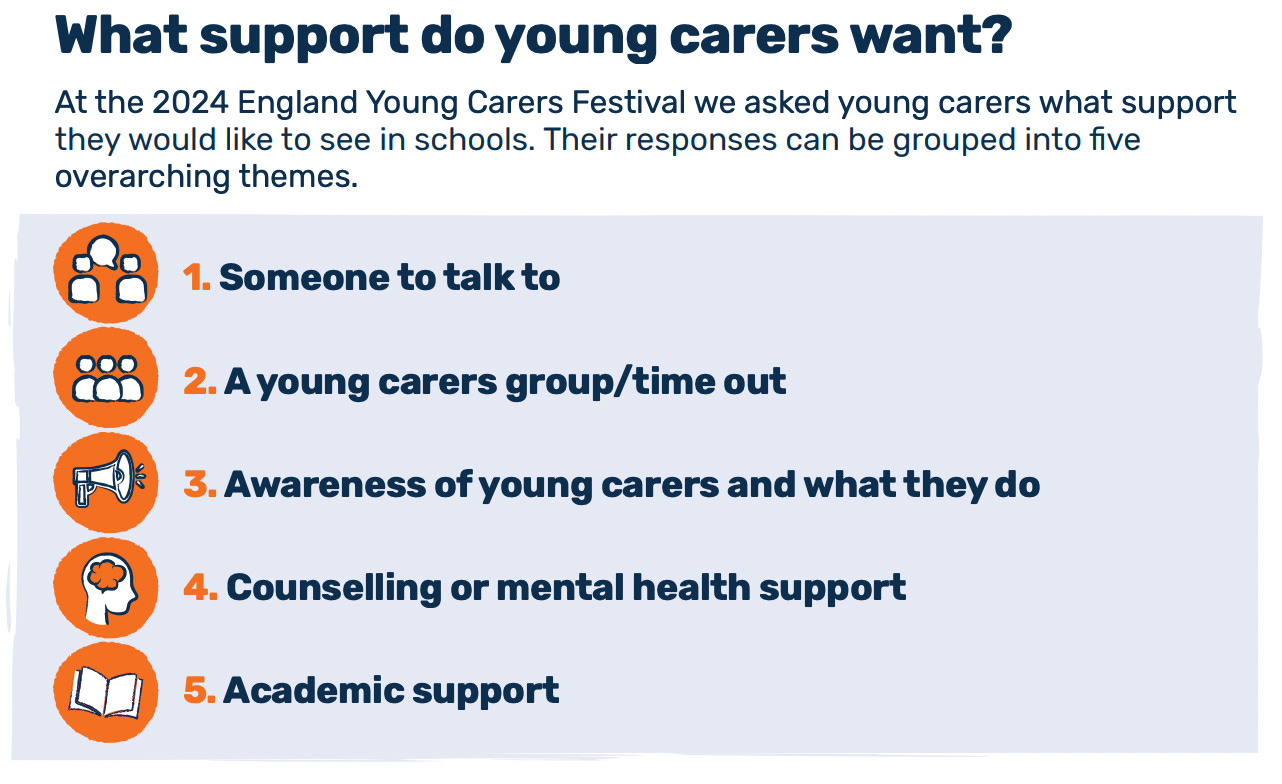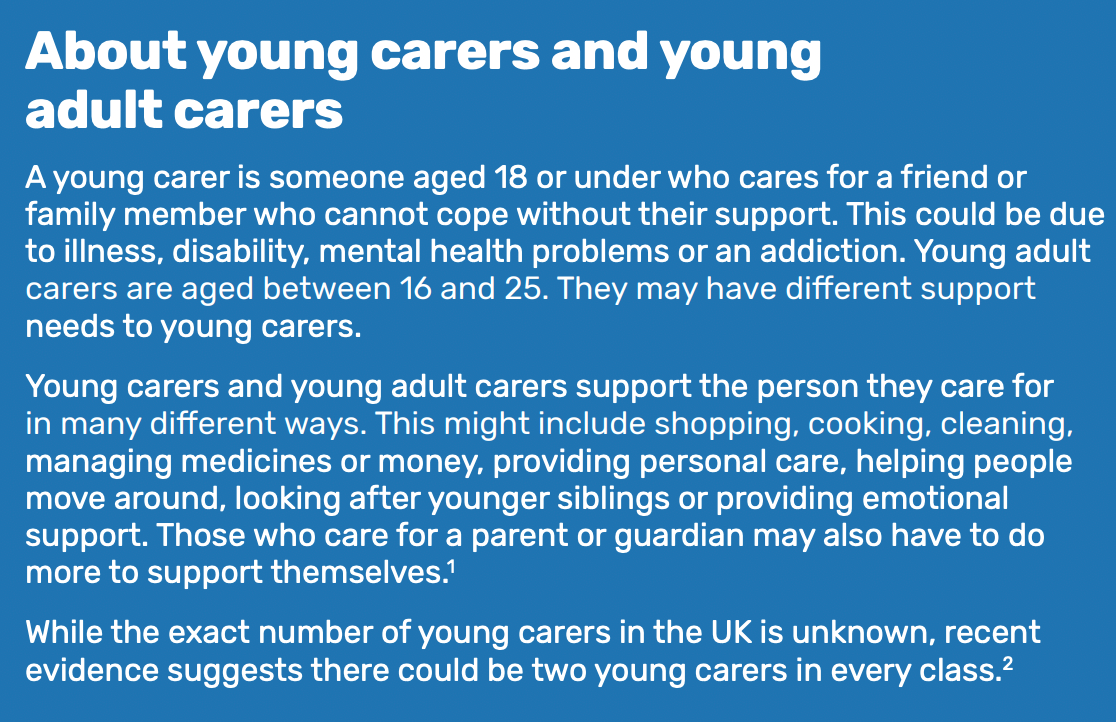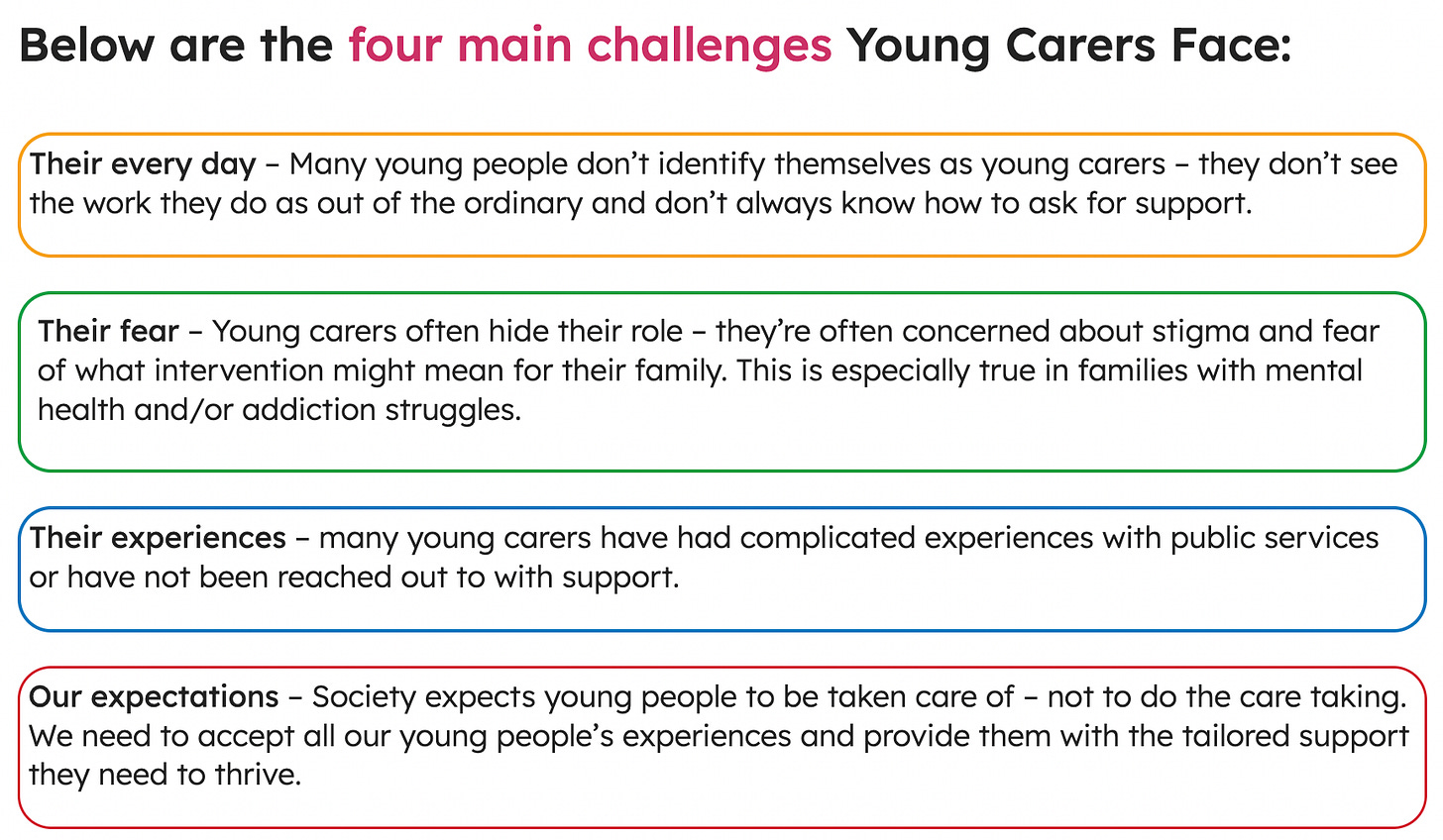When we think of carers, we often automatically think of adults, but children and young adults are also carers.
This article provides an introduction to the younger carers in the UK and to the work of organisations such as Carers Trust, which aim to offer them respite and advice.
A Short Film by Young Carers (November 2023)
Young carers and young adult carers1 who provide care to a parent or family member face several challenges compared to their peers, primarily impacting their mental and physical health, educational attainment, and social life.
If you know a child/young adult who is caring for a parent or family member, these links may be helpful to them.
Carers Trust Getting support if you are a young carer or young adult carer
Samaritans. They're there 24 hours a day, 365 days a year, wherever you live in the UK. You can call Samaritans on Freephone: 116 123, 24 hours a day, seven days a week or visit the website for more ways to get in touch. Contact Samaritans Cymru for a Welsh language service.
MIND Crisis and Listening services If you need to talk right now, there are many helplines staffed by trained people ready to listen. They won't judge you, and could help you make sense of what you're feeling.
Young Minds offers information about coping with mental health issues, feelings, symptoms and conditions, wherever you live in the UK. Services include a free 24-hour crisis messenger if you are experiencing a mental health crisis and a Parents Helpline for parents across the UK. Find out more on the Young Minds' website.
UK Citizens Advice website
If you know of young carer organisations in the US, please share them in the comments. Thank you.
While the exact number of young carers in the UK is unknown, recent evidence suggests there could be two young carers in every class.
Evidence from the Sutton Trust highlights that young carers are more likely to live in areas of high deprivation, and that many high-potential, disadvantaged young people are three times more likely to be young carers.
This data also indicates that young carers are four times more likely than their peers to live in a single-parent household, often trying to operate within a much lower household income than coupled households and with less access to savings. Not only is it clear that the talent of these children and young people are not being fully realised, but they face further inequalities in terms of household income and potential over-dependence on an inadequate social security system. This can permanently limit their social mobility as well as the physical and mental toll that caring for a family member often presents. Like other age groups of carers, young carers quickly encounter that society and the systems and services we have built do not value unpaid care work. (July 3, 2023) Society is closing its eyes to young carer poverty - we must do better Blog by Sheena McMullen, Action for Children and Carer Poverty Commission Steering Group member.
Young carers experience significant inequalities compared to their peers, affecting their education, health, and overall well-being, and thus their prospects. As young carers may not recognise themselves as carers they don’t actively seek support. Available support by trained staff in schools or social care system is a ‘postcode lottery’, inconsistent.
Specific Young Carers’ Challenges:
Mental Health: Young carers are more likely to experience anxiety, depression, and other mental health issues due to the stress of caring.2 34
Educational Attainment: Young carers are more likely to be absent from school5, have lower educational attainment, and face challenges with studying and focusing due to caring responsibilities. 6
Social Participation: Young carers may miss out on social activities and friendships due to their caring roles, leading to feelings of isolation and loneliness. 7
Lack of Breaks and Respite: Young carers often lack the time and support they need to have breaks from their caring role and engage in leisure activities.
Financial Inequality: Families with young carers may experience lower incomes, leading to financial stress and potentially impacting a young carer's ability to access resources and opportunities 89
Lack of Understanding: Young carers may struggle to get understanding from friends, family, or teachers regarding their caring responsibilities. Some young carers may experience bullying due to their caring role or perceived differences. 10
Lack of Information and Recognition: Like adult carers, young carers feel undervalued and marginalised. Underreported numbers of carers, and lower demand for services and support leads to an underestimation of resources. To the untrained eye, young carers are misunderstood children/young adults and their potential goes unrealised.
Four Challenges Young Carers Face By MCR Pathways:
When you read more about Carers’ Stories on the Carers Trust Website, you’ll see the depth, diversity and intensity of the caring that they do.
As you may expect, these young people have had to mature much younger than their peers. What I found slightly incongruous was to hear/read the mature, insightful self-reflections that were being made by these children.
Supporting young carers requires a multi-faceted, whole-family approach, including mental health support, educational assistance, respite care, and fostering connections with peers and the community.

…And it all starts with Recognition, Identification and Appreciation of Young Carers
(March 2024). Young Carers Action Week “Fair Futures for Young Carers" 2024 Sharan’s Story
(Timestamp 3.12) I think a fair future for young carers means, where people recognise, education, and employment recognise what a young carer is and how they can support them because without a Fair Future these carers, they're not going to be interested in pursuing further education, they're not going to be interested in pursuing employment, they're not going to be interested in any training opportunities.

The Carers Trust offers practical advice and support:
Carers Trust partners with The Children's Society to run the Young Carers in Schools programme helping schools spot hidden young carers, understand their needs, and put support in place that can transform lives.
The Trust coordinates the Young Carers Alliance (200+ organizations, 700+ individuals) and Scottish Young Carers Services Alliance (51 services).
It also provides secretariat support to parliamentary groups for young carers in both England and Scotland.
Carers Trust provides opportunities for young adult carers to develop aspirations and goals through our Young Carers’ Futures programme.
Share information about financial advice, support and information about benefits
Know Your Rights: A Guide for Young Carers, designed to support young carers and young adult carers (25 and under) in understanding and accessing their rights, benefits, and the help they’re entitled to.
Commentary
I was struck by the title of this report: (March 2023) Being a young carer is not a choice. It’s just what we do. The voices and experiences of young carers and adult carers from across Wales
In the Forward of the report Ollie Mallin (17 years old) shares this
I care for my younger brother, who has many complex additional needs. I’ve cared for him since I was five. I wouldn’t say that my caring role impacts my life; I would say that it is my life. However, caring does put a strain on other parts of my life. School has always been hard for me, teachers haven’t always understood my experience and my caring role has made it very hard for me to stay up-to-date with coursework or to focus in lessons.
There’s no judgment. Caring is part of what he does and it’s a role. While he acknowledges that he’s a carer, he also recognises that there is more to his life beyond this, and that’s where he needs help.
There are some great initiatives that have been started in schools and universities, to spot young carers and offer support.
Where I think we can all do more is being an active listener to any young person who may be caring for someone who has a chronically ill or disabled family member, parent, grandparent or sibling.
For example, MCR Pathways has set up a mentoring system in the UK to offer consistent support for young people.
Let’s take note of the fears young carers may have (see above) and support them based on their needs, not what we think they need.
Do you know a young carer?
Please remember to ‘❤️’ LIKE the article to guide others to these resources.
Thank you!
Four Challenges Young Carers Face & How YOU Can Help By MCR Pathways
As defined by the The Carers (Scotland) Act, “a young carer is aged under 18 years or aged 18 and a pupil at school and who provides or intends to provide care for another individual.” According to Carers.org as many as 1 in 5 young people may be considered a young carer.
These young people are working a second shift in addition to their school work. Being a Young Carer affects both their health and their futures.
They are twice as likely as other young people to report mental health conditions. Additionally, 27% of young carers reported that their home duties caused problems at school and half say caring for a family member has a negative impact on their school work.
Jan 2018 Meeting the health and wellbeing needs of young carers
A young carer is defined in section 96 of the Children and Families Act as a person under 18 who provides or intends to provide care for another person of any age. That can be a parent or sibling, grandparent of friend. It can include help for physical or mental illness, frailty in old age, a disability or because of substance misuse. The Children and Families Act 2014 and the Care Act 2014 placed a legal duty on local authorities from 1 April 2015 to identify young carers and carry out both a needs assessment and a transition assessment to consider the impact on the child and whole family. They build on the requirements set out by the Children’s Act 1989.
(March 21, 2024) Carers Trust reacts to figures showing persistent absence rate for young carers is nearly twice as high as for their peers Carers Trust’s Policy and Practice Manager, Andy McGowan, said:
“These figures should ring alarm bells in government, showing all too starkly how being a young carer can have a devastating impact on children’s education and future prospects. Young carers have a persistent absence rate of 39% - almost twice as high as their peers. On average they miss 23 days of school per year, far more than those without a caring role. This lays bare the glaring inequality in the life opportunities for young carers compared to their classmates.
“There are one million young carers in the UK – that’s two in every classroom - including at least 15,000 children caring for over 50 hours each week. By selflessly looking after loved ones they’re saving the state millions in social care costs and deserve targeted support. That’s why it’s essential that the Government requires every school to have a young carer lead and policy in place. A cross-government national carers strategy is also desperately required, along with funding, to ensure these young people and their families get the help they need.”
Carers Trust have produced an insights briefing summarising the main findings as well as the evidence from other studies relating to young carers and education. This can be accessed here.
(Sept 24, 2024) Caring and Classes: The Education Gap for Young Carers By Andy McGowan, Policy and Practice Manager at Carers Trust and Eden and Lewis, members of the Young People’s Working Group
"This report sets out the state of young carers’ educational attainment and opportunities in England in 2024. It proposes policy and practice solutions, as well as recommendations to improve recognition and identification of, and support for, young carers throughout their education. Ten years ago, legislation designed to help young carers to thrive in education (ref 5 below) was introduced. But schools, local authorities, young carer services and, most importantly, young carers themselves have told us about the continued inequity that exists for hundreds of thousands of young carers."
(March 12, 2025) More than half of young carers aren’t getting the breaks they need, alarming survey finds By Carers Trust
Young carers take open top bus to Westminster on Young Carers Action Day to call on MPs and decision-makers for more support
- Almost a quarter of young carers say no one else can provide the care they do
- Two-fifths worry too much about the person they care for to take a break
- 72% miss out on the school holidays, nearly half miss out on friendships and almost one in five say they’re missing time out of their education
More than half of young carers can’t get a regular break from caring, while almost a quarter say there’s no one else to provide the care they do, an alarming survey has found.
The findings have been released by Carers Trust for Young Carers Action Day on 12 March. The time young carers spend on their caring role mean young carers often miss out on education, friendships, holidays and many other things their classmates take for granted, the survey showed.
The survey of 423 young and young adult carers found nearly one in five rarely or never get a break (17%), while 40% said they got one only some of the time. Just 15% said they could take a break whenever they wanted.
Asked what stopped them getting a break, almost a quarter (23%) said there was no one else to provide the care they give. Two-fifths (40%) said they worried too much about the person they care for to take time out from looking after them.


